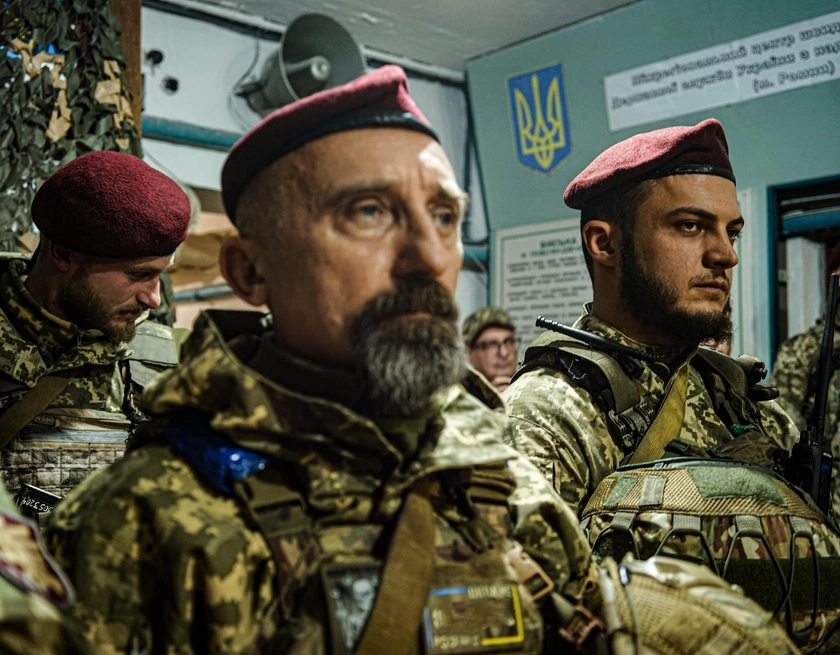I was born into a Christian home. And though most observers would consider me a “practicing” Christian, I prefer to call myself a disciple of Jesus Christ.
A semantic ploy, maybe, but it helps get me past all the annoying dogmas, legalisms, and simply ridiculous teachings encrusted over various Christian traditions.
JOIN US ON TELEGRAM
Follow our coverage of the war on the @Kyivpost_official.
I was also born into a Ukrainian home – albeit, in the United States – where we spoke Ukrainian and tried to keep Ukraine’s spirit alive.
So fast-forward more than half a century from my birth till today, and it should be understandable why I spend so much of my day reveling in the death of Russian soldiers come to conquer Ukraine.
There’s no moral ambiguity from the nationalist side. As someone admittedly practiced in the craft of geopolitical nuancing, I have never in my life seen such a blatant case of black and white, where the level of cruelty and destruction is matched only by the mendacity and/or silence of the side perpetrating it.
As a disciple of Jesus Christ, however, my master’s marching orders are extremely clear: “Love your enemies and pray for those who persecute you. (Matthew 5:44)”
I don’t sweat my hypocrisy much. For me, the spiritual path, as a disciple of Christ, is primarily relational. That is, I strive to continually deepen my relationship with this God-man Jesus – his way, his truth, his life. He is a beacon.

Fighting Across Ukraine War Front Fierce but Static
The fact that his few recorded injunctions – if thy right eye offend thee… turn the other cheek… be thou perfect… – are impossible to follow doesn’t bother me much either. On the contrary, the impossibility reassures me. It’s an asymptotic relationship, like a line that approaches a curve but can never touch it at any finite distance. I strive to be perfect, knowing I never will. Ultimately, it’s the striving that keeps me sane, makes me whole.
I try to apply this bit of casuistry to my relationship with Vladimir Putin and those who carry out his orders. I want to kill them. Every day.
I have few qualms about wanting to kill. I know too painfully just how capable I am of hatred and violence. But I recognize that this makes me human. And this recognition serves to keep me humble, if nothing else.
I was born in the United States, a rather violent gun-loving culture. I grew up watching violent films and enjoying violent sports. Combined with an overlay of Cossack warrior mythos, I’ve developed a high tolerance for bloodlust.
So I spend way too much of my day indulging in all the videos of enemy tanks on fire and orcs getting their limbs blown off in trenches. I have no illusions about how poisonous this can be for the human psyche.
But I still can’t fathom what it’s like for those actually in the trenches.
As such, I worry about the men and women coming back from the front. I see some of them in Kyiv, obviously damaged – physically, psychically, or otherwise. It won’t be easy for society to take care of these people when peace comes – not even if the victorious soldiers are treated like heroes.
I even worry about my own psyche, jaded by so much granular analysis of this war.
But I don’t worry too much about Putin. I pray for him, for his soul – or at least try, despite my wish to see him burn in some eternal hell (one of those ridiculous teachings I’ve long dismissed).
Central to my own faith is the trust that God’s mysterious will can set me free, whereas my own will (if experience is any indication) usually gets me into serious trouble. So I pray, like my master taught, for God’s will to be done; and for myself to have the wisdom to discern the difference between God’s will and my own. Not easy.
Also central to my faith is the trust that God can deal with matters – such as meting out justice to Putin – much better than I can.
What’s more, by praying for God to deal with this monster and his minions, I open a sort of release valve for the poison that builds in me every day. And I do let it build, consciously – because I refuse to turn a blind eye.
So to keep things simple, I do what I can to help Ukraine defend itself. And I appeal to divine justice for Putin to get what he merits.
I fantasize about his corpse hanging upside down in the middle of a square, like Mussolini’s; or him dragged, hands tied behind his back, to his filmed execution like Nicolae Ceaușescu; or burnt to a crisp in some bunker like Hitler. I imagine him sitting in The Hague trying to justify his crimes, like Göring at Nuremberg.
I even try to imagine Putin struck like Paul on the road to Damascus – instantly converted and repentant, offering Ukrainians recompense and redemption. Or, unlike Paul, in the wake of his dread realization, that “he himself might his quietus make,” as Hamlet mused, with a kinzhal – “a consummation devoutly to be wished.”
But I try not to overly indulge such fantasies. I don’t want to give that creature too much space in my mind. I prefer to let God deal with the matters that for me are only fantasy.
In the meantime, I do my best to maintain a delicate balance between keeping the poison at bay and never turning away from what’s happening. Prayer helps; though admittedly, I’m still a long way from wishing the devil well.
You can also highlight the text and press Ctrl + Enter











